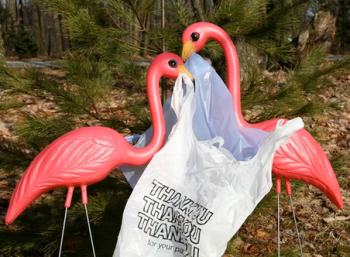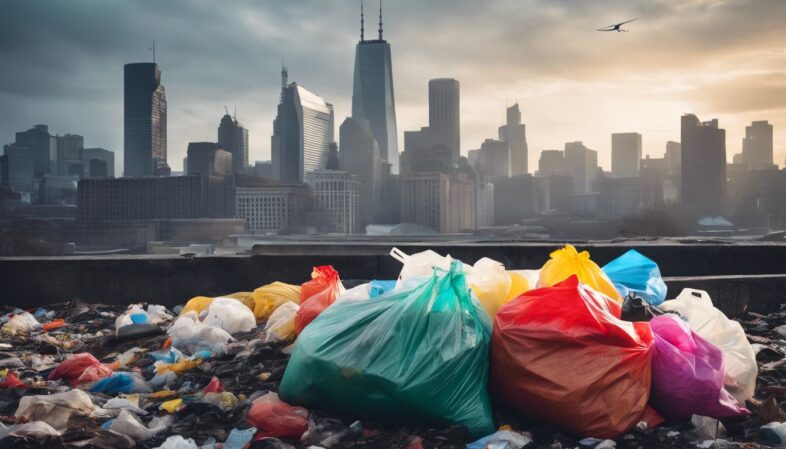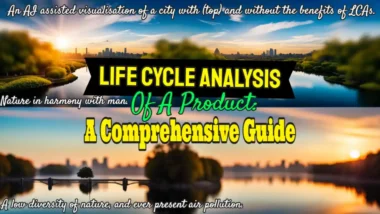Taxing plastic bags does work. Read on to find out the results of taxing plastic bags in England and Portugal.
Plastic bags pose a big problem for our environment. To stem an ever-rising litter problem, in October 2015, England implemented a 5p fee on single-use plastic carrier bags. From May 21, 2021, it was raised to 10p and extended to all retailers, regardless of size.
The English plastic bag charge has shown success in cutting down on waste. This article will explore how taxing these bags changes the way we shop and helps the planet.
Keep reading to learn more!
Key Takeaways
- Taxing plastic bags makes people use fewer single-use plastics and choose reusable bags instead. This change has been seen in England and Portugal where taxes led to a big drop in the use of plastic bags.
- The money from plastic bag taxes helps the environment and charities. It reduces waste and pollution, helping our planet stay cleaner.
- Even though taxing plastic bags is good for the earth, some shoppers and shops find it hard to switch because of the costs. However, teaching everyone about eco-friendly choices can help overcome these challenges.
- Creative solutions like using biodegradable bags or recycling more can also lower the need for single-use plastics. Everyone working together can make a bigger difference.
The Purpose of Taxing Plastic Bags
Taxing plastic bags aims to reduce consumer use of single-use plastic and encourage sustainable behaviour. It promotes the adoption of reusable bags and supports waste reduction, environmental sustainability, and conservation efforts.

Taxing plastic bags – known to most people as “carrier bag charges”
In England, the plastic bag tax has required all shops to charge shoppers every time they are givem a bag at the checkout.
Carrier bag charges are fees imposed on single-use bags provided by retailers to customers. These charges are part of environmental policies aimed at reducing waste and encouraging sustainable practices.
Examining Health Risks and Management Challenges of Food Packaging Materials
Health Risks of Persistent Harmful Chemicals in Food Packaging
Public concern is growing regarding the presence of harmful chemicals such as phthalates and bisphenol A (BPA) in plastics used in food packaging.
However, these substances are not exclusive to plastic materials; they can also be found in other materials that come into contact with food. For instance, BPA although banned from Europe may still be used as a coating inside some metal containers in some countries.
Furthermore, per- and poly-fluoroalkyl substances (PFAS), which are a group of toxic chemicals linked to various health issues like high cholesterol, reduced fertility, and testicular cancer, are employed to enhance the water resistance of paper, card, and compostable takeaway containers and food packaging.
A study conducted in December 2019 revealed the presence of these chemicals in packaging from all nine major UK supermarkets sampled, as well as many takeaway outlets. This discovery underscores the urgency of reviewing regulations for all types of food packaging, not just those made of plastic.
Poor Management of Compostable Plastics Leading to Unintended Consequences
As the world seeks solutions to plastic pollution, the use of compostable plastics has been on the rise.
However, these materials do not always degrade in the manner expected and require a specific collection and processing system, which is often either nonexistent or inadequate. A case in point is the Houses of Parliament’s switch to compostable packaging in October 2018.
Despite the introduction of dedicated composting bins, the failure to prevent contamination with other materials meant that all collected compostable waste had to be incinerated during the first six months of the initiative.
Although this issue has since been resolved within the parliamentary estate, it highlights the broader challenge: effective management of the entire system is crucial to achieving the intended environmental benefits of using compostable plastics, not just selective taxation charges.
(Plastic contamination in organic waste can be removed in a process known as depackaging and separation of the organic content from “other” (contaminating) wastes.)

Here’s a breakdown of what these charges entail and their objectives:
Reducing consumer use of single-use plastic bags
Governments are taxing plastic bags to make people use fewer single-use plastics. This tax pushes shoppers to change their habits, favouring reusable bags over disposable ones. Studies from England and Portugal show that these taxes work.
In Portugal, the consumption of plastic bags dropped by 74% after they introduced a tax.
Reusable bags have become more popular because of these policies. People are choosing eco-friendly options more often, reducing waste and environmental impact. Next, we explore how this move also supports broader environmental goals and charitable efforts.
Promoting sustainable behaviour
Taxing plastic bags can encourage people to make eco-friendly choices. It has been shown to lead to a significant decrease in plastic bag consumption and an increase in the use of reusable bags.
Regulations, such as taxing plastic bags, are designed to enhance sustainable living and reduce environmental problems caused by plastic waste.
 Plastic bag taxes provide an opportunity for sustainable development by promoting sustainable behaviour. They contribute to environmental sustainability by reducing single-use plastic waste while encouraging consumers to opt for reusable alternatives.
Plastic bag taxes provide an opportunity for sustainable development by promoting sustainable behaviour. They contribute to environmental sustainability by reducing single-use plastic waste while encouraging consumers to opt for reusable alternatives.
Environmental and Social Impact
Decrease in plastic pollution
There is plenty of evidence to show that taxing plastic bags leads to a significant reduction in plastic waste and the resulting plastic pollution. This has been proven effective in countries like England and Portugal, where plastic bag taxes have resulted in a drastic decrease in single-use plastic film consumption.
Such measures encourage the use of eco-friendly alternatives, supporting environmental conservation efforts and contributing to sustainable consumption practices. Consequently, these initiatives help reduce marine pollution associated with plastic waste, promoting a cleaner and healthier environment.
Furthermore, implementing taxes on plastic bags can inspire businesses to adopt more sustainable packaging materials, ultimately reducing the overall impact of plastic pollution on our planet.
Support for environmental and conservation efforts
Plastic bag taxes support environmental and conservation efforts by reducing plastic waste and pollution. They encourage people to choose eco-friendly alternatives, such as reusable bags and recycling initiatives.
These measures underpin the goal of sustainable development through regulations aimed at reducing environmental problems caused by plastic waste. The Portuguese plastic carrier bag tax resulted in a 74% reduction in plastic bag consumption and a 61% increase in reusable plastic bag usage, demonstrating the positive impact of such initiatives on the environment.
The Single Use Carrier Bags Charge (Wales) Regulations 2010 compel all retailers to charge at least 5p for each new single-use carrier bag they deliver, with some Welsh exceptions. There is also a plastic bag charge in Scotland.
Biodegradable and most varieties of paper bags are included in the tax in Wales, Scotland, and Northern Ireland, but are often not taxed elsewhere. For example, paper bags are exempt in England.
Furthermore, taxing plastic bags can also lead to governments using some of the money collected as financial support for charities focused on environmental conservation. This creates an opportunity for businesses to embrace more sustainable materials for packaging purposes.
Financial support for charities
Taxing plastic bags not only reduces single-use plastic but also provides financial support for charities. The revenue generated from the plastic bag fee can be directed towards environmental and conservation efforts, aiding charities focused on sustainability.
This funding supports initiatives aimed at reducing plastic waste and pollution, boosting the overall impact of environmental organisations.
Moreover, the taxation policies create an incentive for businesses to adopt more sustainable materials in their packaging, contributing to environmental sustainability. As a result, this encourages eco-friendly choices among consumers and fosters a positive shift towards reusable alternatives.
Potential Challenges
Challenges may arise from resistance by consumers and retailers to the implementation and enforcement of the tax, along with finding alternative solutions for plastic bag use.
These challenges could impact the effectiveness of promoting sustainable behaviour through taxing plastic bags.

Resistance from consumers and retailers
Consumers and retailers may resist the plastic bag tax due to increased costs. Some consumers might find it more challenging to embrace eco-friendly choices if they perceive them as pricier than single-use plastic options.
Furthermore, retailers may face pushback from customers unhappy about the added expense of reusable bags or alternative packaging. This resistance could hinder the successful implementation of the plastic bag tax and impede progress towards sustainable habits.
The challenges in persuading both consumers and retailers to accept this change include overcoming cost concerns for consumers as well as adjusting business practices for retailers.
Implementation and enforcement of the tax
The government enforces plastic bag taxes to reduce single-use plastic consumption. This approach involves strict regulations and penalties for non-compliance, encouraging businesses and consumers to opt for eco-friendly alternatives.
Plastic bag taxes aim to change consumer behaviour by making sustainable choices more appealing.

These taxes are not just limited to the UK; Portugal experienced a 74% drop in plastic bag usage through its carrier bag tax. The success of these measures highlights their potential impact on reducing environmental degradation caused by single-use plastics.
The UK government has since introduced an additional levy on plastic packaging that does not contain a minimum level of at least 30% recycled content, from April 2022, subject to consultation. It has done this to stimulate increased use of recycled plastic to combat plastic waste and to further safeguard the environment.
Finding alternative solutions for plastic bag use
Encouraging reusable bag use is vital. Educate consumers on the benefits of using eco-friendly alternatives. Implement incentives for reusable bag usage, such as discounts or rewards points.
Offer durable and affordable reusable bags in stores.
Introduce innovative packaging solutions. Explore biodegradable and compostable options. Engage with businesses to promote sustainable materials for packaging. Collaborate with manufacturers to develop eco-friendly packaging alternatives.
Conclusion
In conclusion, taxing plastic bags has a substantial impact on consumer behaviour and environmental sustainability. By reducing single-use plastic usage, promoting eco-friendly choices, and supporting conservation efforts, it underpins the importance of sustainable development.
The practicality and efficiency of this approach prompt individuals to reimagine their habits. How can you contribute to this change? Emphasising the significance of using reusable alternatives can lead to remarkable improvements in reducing plastic waste.
Take action today for a greener tomorrow!
FAQs
1. What happens when the government taxes plastic bags?
When the government puts a tax on plastic bags, it makes people think twice before using them. This can lead to more eco-friendly choices, like using reusable bags instead.
2. Does taxing plastic bags really change how people act?
Yes, adding a tax on single-use plastic bags has been shown to change consumer habits. People start avoiding these bags to save money and help the environment.
3. Can taxing plastic bags help our planet?
Definitely! By encouraging consumers to switch from single-use plastics to eco-friendly alternatives, we reduce pollution and protect wildlife.
4. Are there other benefits of taxing plastic bags besides helping the environment?
Besides helping the environment by reducing waste, taxing plastic bags also pushes people towards better habits and supports government regulations aimed at sustainability.
[Original article posted 25 September 2011.]






Fantastic site. Lots of helpful information here. Using tax to change what we do, can work.